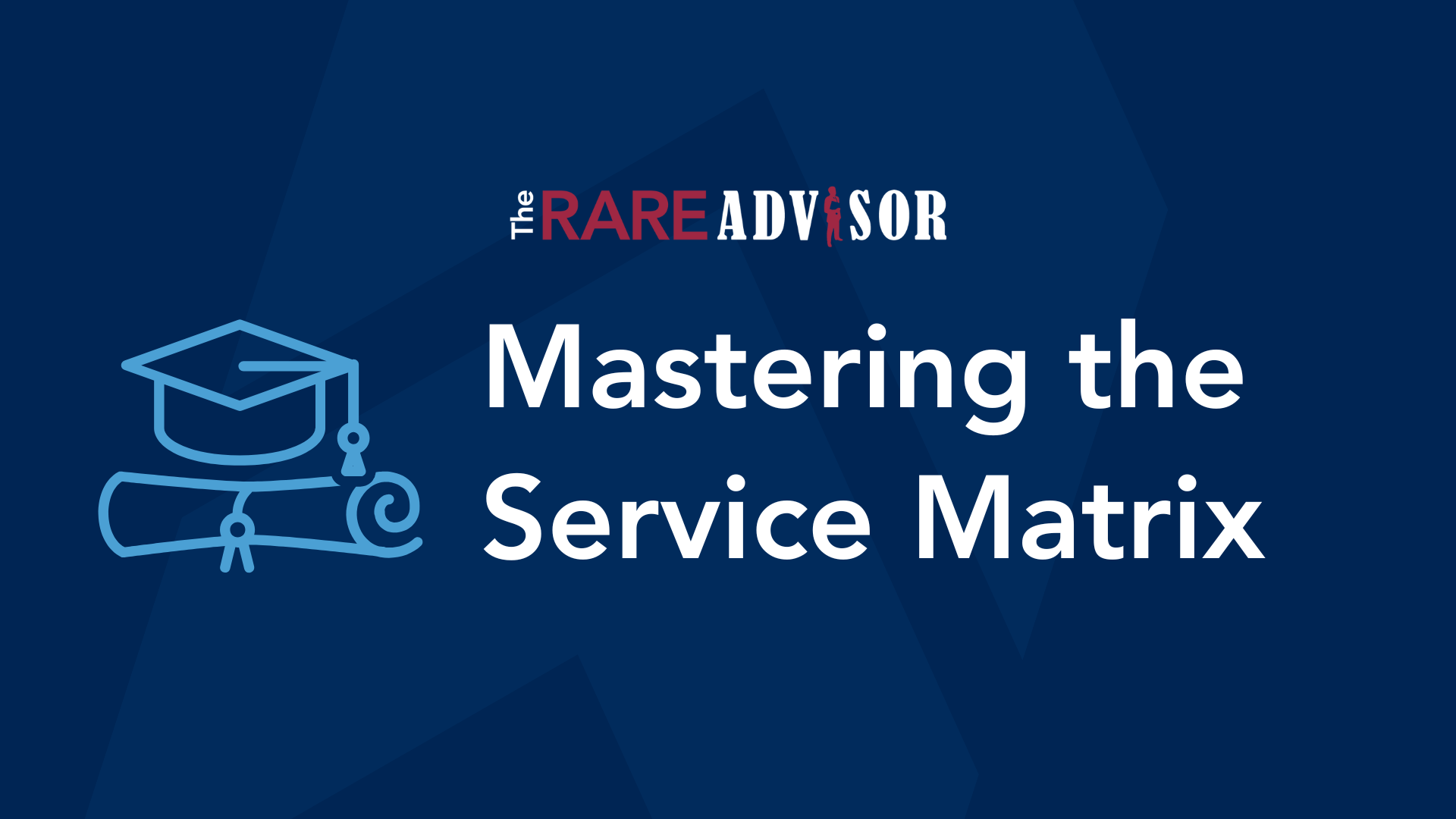Don't Bite the Hook

There’s all sorts of bait in the water out there trying to tell you the valuation multiples on your practice. But, beware... If you bite down on that hook hard, you might find yourself getting reeled in on a deal that will undermine the career’s worth of work you’ve put into building your practice. We’ll talk about some of the things you should be doing in your business to avoid the smoke and mirrors when it comes to valuation in this episode of Future Zeros.
Not long ago, I ran across a business cartoon that really caught my attention. It was two fish floating in the water staring at a hook with a worm on it and one of the fish says, "I don't know, Bob, seems like there's always a catch". And then, next to the worm, it says "unsolicited, unrealistic valuation multiples". That's a pretty good warning for pretty much every independent advisor who owns their own practice.
There's no doubt your email inbox has filled up with all kinds of different solicitations and offers about the value of your business, and that there's hundreds of different people standing in line to purchase your practice, and trying to tell you how much it's worth, and so on. And while your practice is extremely valuable, it's not near as easy as people would try to make it seem to find an appropriate buyer, one that's actually going to make sense for you, for your staff, for your clientele, for the type of value that you are looking to extract, for the type of culture that you have built, for the fact that you care for so many people in your life - customers, employees, family and otherwise - that you want all of this to be taken care of properly, and when and how you might want to exit. Or maybe there's an internal succession plan that you have in place. Maybe there's next gen, maybe there's family, maybe you're looking at an external opportunity, maybe there's an advisor on the other side of town, maybe there's more of an aggregation opportunity with a group like USA Financial who will come in and buy your practice from you, and so on. There's all these different variations, but the problem is, the bait on the hook is usually too good to be true.
So, for example, I actually received a solicitation and then I had an advisor send me the exact same solicitation and ask me my thoughts on it. I dug into it and it was offering or projecting the idea that you were going to get this valuation multiple that was literally over twice what the going market rate is today. So at first glance, you know it's BS. However, if you don't track this stuff the way I do, if you're not helping advisors through mergers and acquisitions, succession, and transitions on a daily basis, you don't really know what the marketplace is. And you see a number or some multiple and you just assume, if they're putting it in print it must be true - even though it's literally over double what the market would bring in real life. Well, as I dug into it and I explored it, what I came to find out is, well, they're really only willing to buy one small subset of your practice, and that was the assets under management. They won't pay you for any of the rest of it. So you're basically giving a hunk away for free in order to get paid more than the normal street level on the remainder. And then the additional catch to it was that not only did you have to change the custodian and repaper, you had to join their TAMP program and repaper into that. And then within their TAMP program, the only thing you could invest in were the homegrown investment strategies they had created themselves. They were creating layer upon layer of profit on their side so that they could over-inflate an offer to someone at the retail level, but then not extend that to the full practice. So only pay for maybe half of the practice, but get the full practice.
In other words, if you have half of your business is recurring revenue and half of your business is transactional revenue, you can sell the recurring side for this multiple that was way above the normal street level. You would have to give them the transactional piece for zero, and then you would have to hyper focus the AUM side into a very tight niche that is very biased niche of only one subset of investment strategies from one strategist. So you end up with bias issues. You end up with conflict of interest issues. You end up with an unrealistic or an unmorally honest valuation of your business, and right on down the list. So just because you see it doesn't mean the numbers are correct.
If you want actual real numbers, you can go to something like the USA Financial Blue Book, which is a tool that we have created, and we kind of monitor the marketplace. And it's like getting a blue book value on your car. You can get a quick assessment as to what is the true overall valuation of your practice in the marketplace. It usually comes in about 1 to 3% range of a full-blown paid-for appraisal, so it's highly accurate. But you can also do that. You can go get yourself an appraisal. You could do a long distance appraisal for probably less than $2,000
or you could do a boots-on-the-ground full-blown business appraisal for probably more like $12,000 to $15,000. There's all kinds of different solutions out there to help you figure out what the right numbers are, and what the real numbers are. We're happy to help you here at USA Financial, but just keep your eye out. Make sure you don't bite the hook and then wish you hadn't.
--
Future Zeros is a series for financial advisors who want to increase the value of their firm today and in the future. Your host, Mike Walters (CEO of USA Financial), digs into the nuances of mergers, acquisitions, and succession within the financial advice industry to help you add “future zeros” to your bottom line. Whether you are nearing an exit, just entering the business, or in the middle of building your practice, the Future Zeros series will provide thoughtful insights into how to grow your practice the right way in order to maximize your future value and minimize the risk associated with doing so.
Author Info

Mike Walters is the Chief Executive Officer (CEO) of USA Financial, leading the firm since its inception in 1988. Mike is committed to...
Related Posts

Continuity Plans vs. Succession Plans: Why Every Advisory Practice Needs Both
What’s the difference between a continuity plan and a succession plan—and why does your advisory practice need both? In this episode of The Rare Advisor, Aaron Grady breaks down these two essential strategies, explains how they protect your firm from unexpected events and prepare you for long-term success, and shares practical steps to start building or improving your plans. If you want to safeguard your business, elevate your professionalism, and protect your legacy, this episode is a must-watch.

Behavioral Finance, Simplified: 5 Biases Advisors Must Use in Their Marketing
In this episode of Financial Advisor’s Marketing Playbook, host Mark Mersman breaks down five core behavioral biases—loss aversion, status quo bias, anchoring, choice overload, and social proof—and shows how each can be translated into clear, compliant marketing messages that resonate with real human decision-making. You’ll learn how to reduce cognitive load, make emotion visible, eliminate friction, and set deliberate anchors in your website copy, emails, seminars, and first meetings. If you want your marketing to reflect how clients actually think and choose advisors, this practical framework will help you shift from a purely logical approach to one that validates emotions first—and earns trust that clients can later justify with facts.

Mastering the Service Matrix: Elevate Client Experience & Drive Advocacy
In this episode of The Rare Advisor, Aaron Grady and Allan Oehrlein dive deep into two essential tools for modern advisory practices: the service matrix and the stewardship framework. Discover why moving from a reactive to a proactive service model is critical for consistency, scalability, and client advocacy. Learn how these frameworks help advisors deliver predictable, high-touch experiences, segment clients effectively, and create professional contrast that sets your firm apart. If you want to elevate your client experience and build loyalty that lasts, this conversation is packed with actionable insights.

Continuity Plans vs. Succession Plans: Why Every Advisory Practice Needs Both
What’s the difference between a continuity plan and a succession plan—and why does your advisory practice need both? In this episode of The Rare Advisor, Aaron Grady breaks down these two essential strategies, explains how they protect your firm from unexpected events and prepare you for long-term success, and shares practical steps to start building or improving your plans. If you want to safeguard your business, elevate your professionalism, and protect your legacy, this episode is a must-watch.

Behavioral Finance, Simplified: 5 Biases Advisors Must Use in Their Marketing
In this episode of Financial Advisor’s Marketing Playbook, host Mark Mersman breaks down five core behavioral biases—loss aversion, status quo bias, anchoring, choice overload, and social proof—and shows how each can be translated into clear, compliant marketing messages that resonate with real human decision-making. You’ll learn how to reduce cognitive load, make emotion visible, eliminate friction, and set deliberate anchors in your website copy, emails, seminars, and first meetings. If you want your marketing to reflect how clients actually think and choose advisors, this practical framework will help you shift from a purely logical approach to one that validates emotions first—and earns trust that clients can later justify with facts.

Mastering the Service Matrix: Elevate Client Experience & Drive Advocacy
In this episode of The Rare Advisor, Aaron Grady and Allan Oehrlein dive deep into two essential tools for modern advisory practices: the service matrix and the stewardship framework. Discover why moving from a reactive to a proactive service model is critical for consistency, scalability, and client advocacy. Learn how these frameworks help advisors deliver predictable, high-touch experiences, segment clients effectively, and create professional contrast that sets your firm apart. If you want to elevate your client experience and build loyalty that lasts, this conversation is packed with actionable insights.

